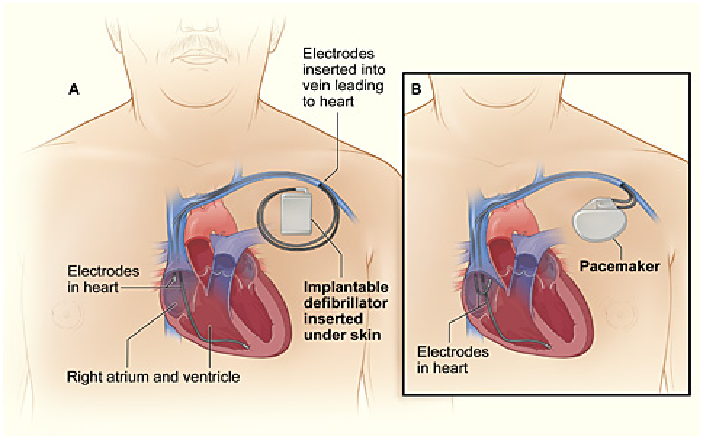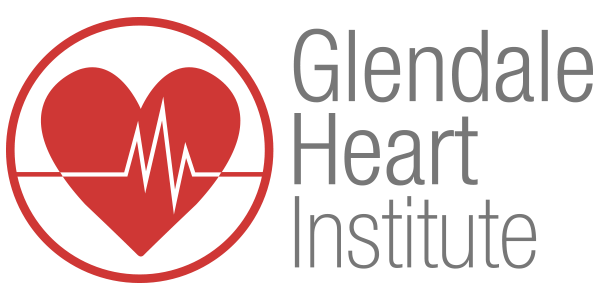What is an Implantable Cardiac Defibrillator (ICD) check?
If you have had an ICD implanted you need to have it checked at regular intervals. This is the timetable for your check-up’s:
• 24 hours after it has being implanted
• 6 weeks after the implant date
• 3 months after the 6 week date
• 6 months after the 3 month date
• Every six months after that.
The check-ups are performed in the diagnostic cardiology department by a technician who will have a computer/programmer to check to ensure the ICD is working properly. They can customize it for you at each appointment to best suit your own heart
How is an ICD check performed?
You will be brought into a cubicle in the pacemaker room.The technician will ask you to remove your top clothes. When you are undressed you will be asked to lie flat on an examination couch. The technician will apply 3 or 4 small stickers called “electrodes” to your chest. The special magnet will be placed over the ICD on your chest. The computer then “talks” to the ICD and tells us how it has been working and if you have had any arrhythmias or fast heart rates. The technician can adjust the settings on the ICD using this magnet and computer. You will not feel anything during the check. The technician may ask you various questions during this to see how you are getting on. The check-up can take up to 30-40 minutes, depending on how complicated your particular ICD is.
If you have had an ICD implanted you need to have it checked at regular intervals. This is the timetable for your check-up’s:
• 24 hours after it has being implanted
• 6 weeks after the implant date
• 3 months after the 6 week date
• 6 months after the 3 month date
• Every six months after that.
The check-ups are performed in the diagnostic cardiology department by a technician who will have a computer/programmer to check to ensure the ICD is working properly. They can customize it for you at each appointment to best suit your own heart
How is an ICD check performed?
You will be brought into a cubicle in the pacemaker room.The technician will ask you to remove your top clothes. When you are undressed you will be asked to lie flat on an examination couch. The technician will apply 3 or 4 small stickers called “electrodes” to your chest. The special magnet will be placed over the ICD on your chest. The computer then “talks” to the ICD and tells us how it has been working and if you have had any arrhythmias or fast heart rates. The technician can adjust the settings on the ICD using this magnet and computer. You will not feel anything during the check. The technician may ask you various questions during this to see how you are getting on. The check-up can take up to 30-40 minutes, depending on how complicated your particular ICD is.

What information can be obtained from an ICD check?
The stickers will be taken off your chest and you may get dressed again. You will then be given an appointment for your next ICD check. The result will be recorded in your special ICD chart and kept until your next check-up. The technician can tell you if your ICD is working properly.
What happens if I receive a shock from my ICD?
Your ICD may never need to shock you. If you do get a shock, Remember a shock is good!!! It may save your life It will usually feel like a thump in the chest.
If you receive one shock, compose yourself, see how you feel and call the medical team or the pacing clinic at the hospital who will then arrange for you to come in and have it checked.
If the ICD gives you more than one shock or if you feel dizzy, pass out, have chest pain or are unwell then dial 911and call an ambulance. DO NOT drive yourself to the hospital.
The stickers will be taken off your chest and you may get dressed again. You will then be given an appointment for your next ICD check. The result will be recorded in your special ICD chart and kept until your next check-up. The technician can tell you if your ICD is working properly.
What happens if I receive a shock from my ICD?
Your ICD may never need to shock you. If you do get a shock, Remember a shock is good!!! It may save your life It will usually feel like a thump in the chest.
If you receive one shock, compose yourself, see how you feel and call the medical team or the pacing clinic at the hospital who will then arrange for you to come in and have it checked.
If the ICD gives you more than one shock or if you feel dizzy, pass out, have chest pain or are unwell then dial 911and call an ambulance. DO NOT drive yourself to the hospital.
Cardiac Specialty Care
• Structural Heart Disease
• TAVR
• CardioMEMS (Heart Failure)
• PFO Closure
• TAVR
• CardioMEMS (Heart Failure)
• PFO Closure
• Coronary Intervention
• Complex Higher-Risk (And Indicated) Patients (CHIP) Angioplasty
• Atherectomy
• Impella and ECMO Support
• Complex Higher-Risk (And Indicated) Patients (CHIP) Angioplasty
• Atherectomy
• Impella and ECMO Support
• Peripheral Angioplasty
• Varicose Vein Treatment (Venous Ablation)
• DVT thrombectomy - IVC filter
• Carotid Stenting
• Varicose Vein Treatment (Venous Ablation)
• DVT thrombectomy - IVC filter
• Carotid Stenting
• Rhythm Management
• Pacemaker
• Holter Monitoring
• Exercise Stress Test
• Echocardiography
• Nuclear Stress Test
• Enhanced External Counterpulsation (EECP)
• Pacemaker
• Holter Monitoring
• Exercise Stress Test
• Echocardiography
• Nuclear Stress Test
• Enhanced External Counterpulsation (EECP)
